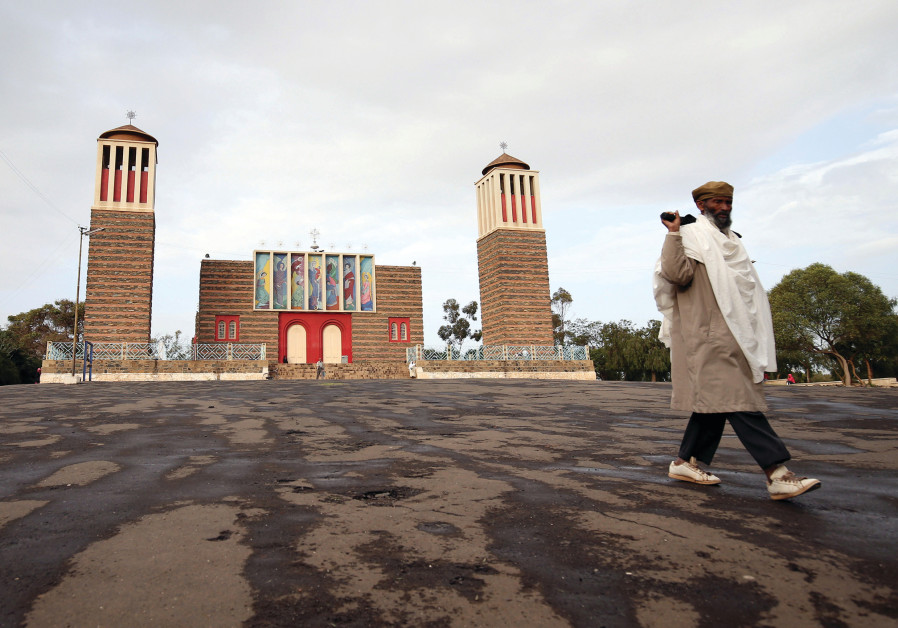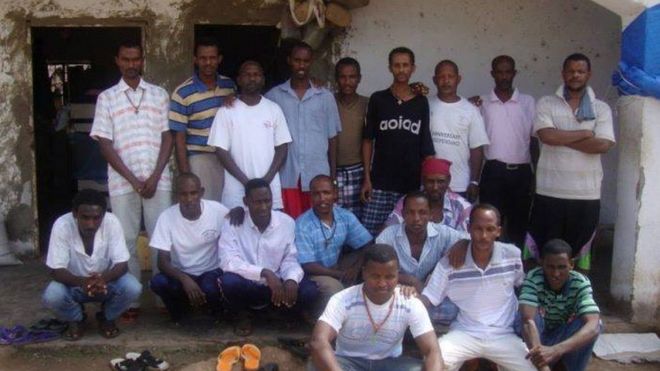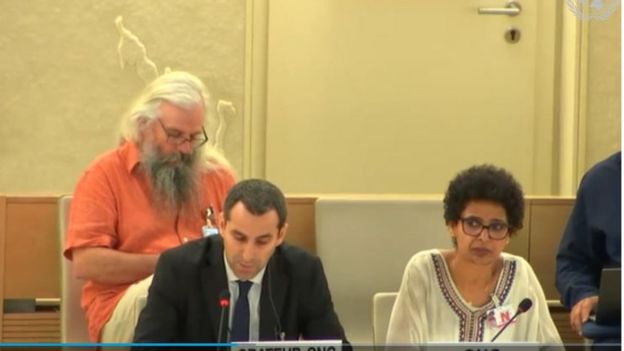Since the Enough/Yi’akil campaign was launched about seven months ago, the campaign has garnered support from Eritreans across the world, including from inside Eritrea. The campaign is a grassroots public movement that has no affiliation with established opposition political parties or groups. The campaign is aimed at bringing about peace, justice and democracy in Eritrea by mobilizing and uniting the Eritrean public at home and abroad to participate in national politics and to speak up for their rights and freedom. For the first time in history, the movement has succeeded in breaking the silence and the cycle of fear of speaking up against the dictatorial regime in Eritrea. Tens of thousands of ordinary Eritreans from all walks of life, at home and abroad, are voicing their support for the enough campaign and calling for justice and democracy in Eritrea openly on social media.
As the Enough/Yi’akil campaign has gone viral on social media, it has enlightened the first generation of Eritreans born abroad. It has also raised their awareness about the political situation in Eritrea. Besides it has galvanized them to join the movement for justice and democracy in their ancestral country. The campaign has also sent shockwaves through the political nerves of the regime in Asmara. That is why during his interview on the occasion of Sawa’s 25th anniversary president Esayas Afeworki tried to downplay the Enough/Yi’akil campaign by labeling the movement as a group of disgruntled people from one region.
Even though it has scored unprecedented success in stimulating tens of thousands of Eritreans, including the silent majority and some former supporters of PFDJ, to call for political change in Eritrea, the Enough/Yi’akil campaign has also had its ups and downs. In grassroots campaigns such as the Enough/Yi’akil campaign, maintaining the momentum can be challenging. Promoting increased public participation needed to make a difference and to bring about political and social change in society is even harder. While the Enough/Yi’akil campaign is still alive, it seems the movement is losing its original zest. The movement’s leadership has been criticized for lack of inclusiveness and participation by all sections of the Eritrean society and implicated for regionalism and lack of transparency. The campaign is still young, and it is expected to face opposition from certain elements of the society and the regime in Eritrea. Moreover, the movement is still very loose and less organized. Its organizers/leaders also voice conflicting ideas about how to go forward. Having said that, the campaign has to find a way to keep its unprecedented momentum and overcome the challenges it has been facing so that to stay as a viable force for political change in Eritrea. One may ask about what can be done to build on the original momentum, gain the support of the majority of the public and succeed in bringing about justice and democracy in Eritrea? My recommendations are as follows:
1.Keep the Enough/Yi’akil campaign as public/mass movement
Unlike the other Eritrean opposition groups/political parties that have been working for political change in Eritrea, the Enough/Yi’akil campaign is a grassroots popular activism initiated by ordinary individuals who are passionate about political and social change in Eritrea. This popular activism has spread as a virus and managed to mobilize the public to drive the political change in Eritrea from the bottom-up. The cause of the Enough/Yiakil campaign is very personal for each and every Eritrean. As such, the campaign must maintain its nature as a popular campaign free from influence by specific political ideologies or political groupings. The movement will lose its popular support and fail to unite the majority of the Eritrea people if it is influenced by or takes sides with political parties/groupings. The Eritrean opposition parties & political organizations must not try to politicize and influence the Enough/Yi’akil campaign. Instead, they have to join this popular campaign as ordinary citizens and contribute their part in bringing about political change, justice and democracy in Eritrea. That doesn't mean to undermine the role of the opposition parties/groups & political organizations. The cause of those opposition parties and the Enough/Yi’akil campaign is the same. As such, the members of those opposition parties/groups can support the Enough/Yi’akil campaign as concerned individuals while they also continue their work for political change in Eritrea with their respective political parties/groups.
- Raise public awareness
Education and information are the backbone of any grassroots mass movement as people cannot participate in the movement if they do not have enough knowledge and awareness about it. Therefore, for the Enough/Yi’akil campaign to be successful it is imperative to raise awareness of the Eritreans in diaspora, especially the silent majority, about the dire political situation in Eritrea and the urgency for justice and democracy in the country. Eritrea is at a breaking point, and all Eritreans need to be informed about it and encouraged to participate to save their country from the brink of total breakdown. In particular, the campaign has to communicate effectively with those Eritreans who were born aboard because this generation lacks a deep understanding about the real political and social crisis in Eritrea. That is why many of them support the regime in Eritrea as members of YPFDJ. These young people should not be alienated and belittled just because they support the regime. Instead, the Enough/Yi’akil campaign has to try to reach out to them, raise their awareness and educate them about what is really happening back home. If majority of these young people join the Enough/Yi’akil campaign, it would be a big blow to the morale of the regime in Eritrea. Because they are well educated, they can also be a formidable force for change in Eritrea through advocacy and raising awareness about the political situation in Eritrea in their respective countries.
The Enough/Yi’akil campaign must strive to increase political maturity of its members, particularly the youth, by providing political and civic education programs through the use of social media and other communication avenues. Political change in Eritrea does not come by insulting the regime and its supports on social media. This is a war of political ideas that requires political maturity and enlightenment. In addition, the Enough/Yiakil campaign must effectively use all available social media outlets and other communication avenues to disseminate its message and to broaden its level of visibility so that to garner more public support. Unless the campaign is able to raise public awareness about the political situation in Eritrea, attract more public support, wins the hearts and minds of all Eritreans at home and abroad, including the supporters of the regime, through effective use of mass media and strong political campaign, the movement may not go far.
- Focus on diversity of ideas
In some regions of the world, the Enough/Yi’akil campaign has been criticized for not being inclusive, and lack of regional, ethnic and religious diversity. Diverse Eritrean communities must add their support to the campaign because diversity in religion, region, and ethnicity adds strength to the movement. But that kind of diversity must not be a sole requirement for participation in the campaign because it could lead to division within the movement. Previous movements for change in Eritrea such as Simer and Simret failed because of regionalism and internal divisions. The Enough/Yi’akil campaign must avoid mistakes made by its predecessors. Albert Einstein once said, “the definition of insanity is doing the same thing over and over again but expecting different results.” If the Enough/Yi’akil campaign repeats same mistakes as its predecessors, it shouldn’t expect different results. It has to avoid regionalism, ethnic and religious divisions at any cost.
The most important diversity that the Enough/Yi’akil campaign should focus on is diversity in ideas. Diversity in ideas is a prerequisite for democracy. A movement with diverse ideas grows and achieves political unity. Plato, a Greek political philosopher, in his renowned work the Republic said, “Political unity is the greatest good for a city-state/society and political disunity is the greatest evil.” Political unity is a source of power and disunity is a source of weakness and failure. As such, the Enough/Yi’akil campaign must promote unity in diversity among all Eritreans. If the campaign manages to foster diversity in ideas and political unity, it will ultimately achieve its goal of bringing peace, justice and democracy in Eritrea.
- Have a clear political roadmap
The Enough/Yi’akil campaign is saying enough to the dictatorship and lack of rule of law in Eritrea. The campaign is calling for regime change and demise of the PFDJ political ideology. Yes, the campaign is calling for justice and democracy in Eritrea, but does it have a clear political alternative and political roadmap on how to achieve that goal from abroad? Does the campaign have a plan on how to spread its tentacles in Eritrea? What will the transitional period look like after regime change? What will be the role of the opposition political parties/groups? …and so forth. Ultimately, the success of the Enough/Yi’akil campaign lies with having a clear roadmap for political change in Eritrea. The campaign needs to involve professionals and experts who can draft a clear political roadmap for the movement. It has to have an operational guidelines/bylaws and political agenda. In addition, the different regional campaigns need to elect pragmatic and servant leaders who can form single international leadership and unite the campaign internationally. It seems a daunting task, but with conviction and commitment it is achievable. The servant leaders have to be democratic and accountable to their people. They must have transparency in all their activities and decisions.
- Effective advocacy and diplomacy
We are in the age of advocacy and diplomacy. Advocacy is a hidden power that works from behind the scenes to influence the people in position of political power to help with a cause of people to make their voices heard in the halls of governments and venues of mass media. For this reason, the Enough/Yi’akil campaign needs to work hard in the field of advocacy and diplomacy so that to attract attention of governments and influential people who can put pressure on the regime in Asmara. The campaign leadership has to identify people who have the expertise to lobby foreign governments, people in power, and influential people like celebrities to advocate for the cause of Eritrean people in their respective countries. For example, some activists of the Enough/Yi’akil campaign met with Congressman Joe Neguse, the U.S. House of Representative from Colorado and discussed ways he could help and advocate for justice and democracy in Eritrea. This is a commendable work and it should be replicated in other regions and countries. If such influential people speak up about the cause of the Enough/Yi’akil campaign, they can attract the attention of the local/international media and can influence the policies of their governments toward Eritrea.
Conclusion
In a nutshell, the Enough/Yi’akil campaign has achieved tremendous success in its short life time. The campaign succeeded in breaking the silence and fear of speaking up against the regime in Eritrea among tens of thousands of Eritrea. The campaign has given hope for Eritreans at home and abroad that political change and democracy may be coming in Eritrea. Yet, the campaign has a long way to go. Unless the Enough/Yi’akil campaign wins the hearts and minds of the majority at home and abroad, organizes itself as a formidable force for change that has a clear political roadmap, influences people in the position of power who can support the campaign from inside of the political system in Eritrea, and be able to replicate the campaign at home, it can be difficult for the popular movement to make real progress towards political change and democracy in Eritrea.
Having said that, I want to leave you with food for thought. The campaign is calling for a total regime change. That is plan A. However, for a regime change you need resources, easy access to the target country, and young people who can be force for political change at home. Unfortunately, majority of the energetic young people who can initiate and lead the political change in Eritrea have either left the country, some are imprisoned, or others are in the military. In addition, there is no access to social media in Eritrea capable of organizing campaigns or demonstration effectively. In the worst-case scenario, what if the struggle for political change prolongs? What if life in Eritrea becomes even harder to bear worse than what it is now? What if Eritrea reaches at the brink of being a failed state? Do the Enough/Yi’akil campaign and the opposition groups/political parties have plan B or any other alternative political solution? I will leave the answer to the readers.
Information about the author
Nuredin Netabay has BA in Political Science and MA in International Peace Studies and Conflict Resolution.




































